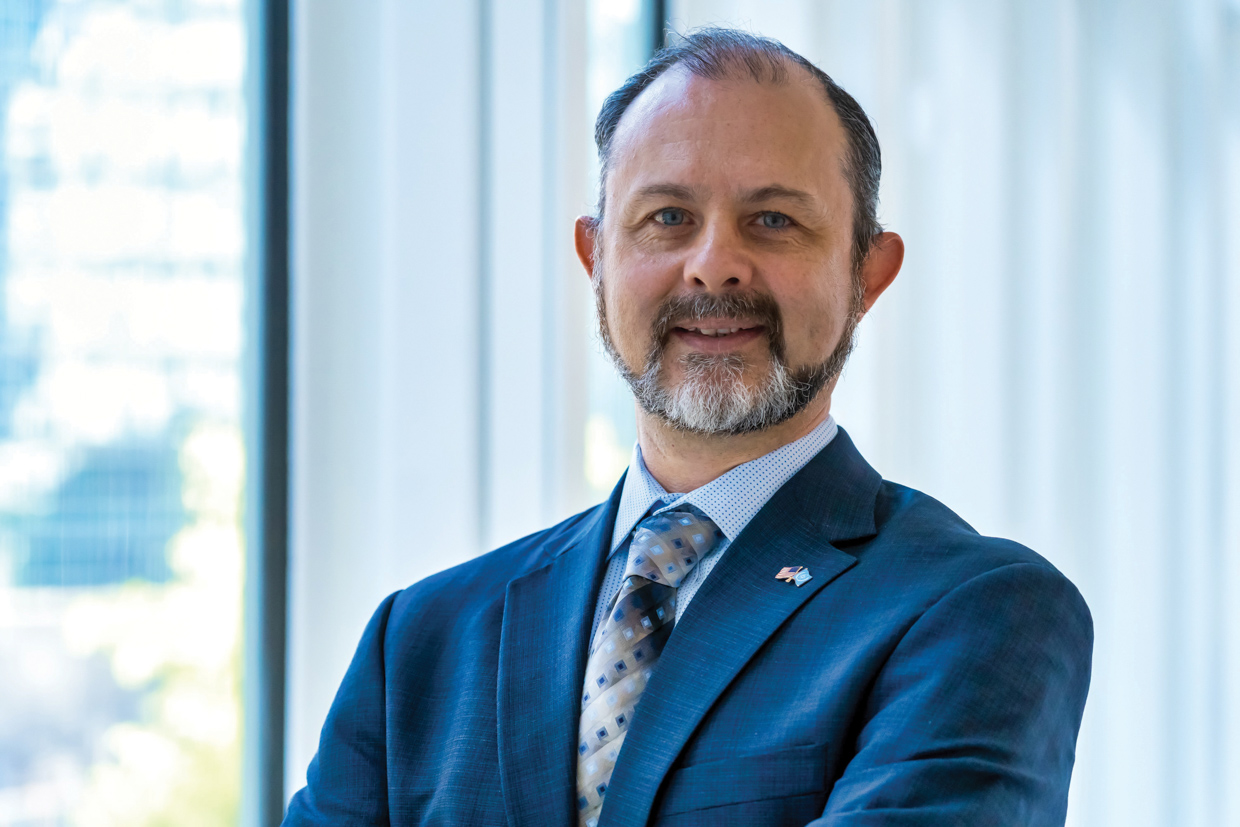Nonproliferation Applied Science Center Energizes Cross-cutting Competencies to Enable Solutions
“The NASC will look for competencies across SRNL and across other labs, plants, sites and universities to tackle problems we see across sponsor spaces.” – Anthony Belian, NASC Director

NASC director Anthony Belian, Ph.D. photo: Savannah River Site Photography
Since coming on board in January 2023, Anthony Belian, Ph.D., the director of the Savannah River National Laboratory’s (SRNL) Nonproliferation Applied Science Center (NASC) has been working on refining and shaping its vision and mission. He is leading the NASC’s efforts in advancing nonproliferation research and development to reduce security concerns, modernizing nonproliferation concepts to accelerate nuclear as a clean energy source and aligning emerging nonproliferation concepts with the growing reactor and fuel-cycle markets. In addition to these areas, his focus is to enable the NASC to be an “incubator of small projects” that crosscut national laboratory competencies and sponsor spaces.
“The goal is to grow small projects into large programs at SRNL,” says Belian. “The NASC will take on projects touching on problems that are common or related to multiple customers, but maybe aren’t high enough in priority for any single customer. In this way we hope to chip away at grand challenges within nuclear nonproliferation that have broader impacts than just nuclear nonproliferation.” The research and development work would be done within the existing technical arms of SRNL with the NASC interfacing with sponsors, securing funding, and overseeing projects. He goes on to say that an example of this would be what to do with aging spent nuclear fuel from power reactors.
Belian explains that the typical organization of national labs has expertise collected and concentrated into groups. These groups typically seek funding for projects from one or two sponsors within the Department of Energy. Over the years of operating in this model, labs tend to build up what he calls “silos of excellence.” He goes on to say that this model is good for a sponsor with unique needs and a working group with unique skills that match, but this is rare. “The NASC will look for competencies across SRNL and across other labs, plants, sites and universities to tackle problems we see across sponsor spaces,” says Belian. “It will take drawing on relationships built over the years through past engagements, projects, and assignments to make this kind of model work.”
Belian and NASC Senior Fellow and Georgia Tech Joint Faculty Appointee Margaret E. Kosal, PhD, are working on some collaborative projects related to NASC mission objectives. “We want to leverage data analytics to help develop new tools that can assist policy makers in developing and implementing a wide range of nuclear policy areas,” says Kosal. “Huge amounts of data are everywhere; we need better tools to make sense of it all, to meaningfully integrate different types of data, and provide timely, actionable input to help policymakers as they make decisions.”
Additionally, the NASC is formulating ways to utilize a nuclear fuel processing line to develop and improve tools used in nuclear compliance activities. “The fuel processing project for one sponsor could be utilized to produce tools for a different sponsor,” says Belian. “These tools range from sampling waste tank head space gasses for specific fission products, to providing a test bed for another national lab’s radiation detection instruments, to researching ways to solidify liquid samples for easier transport while retaining the integrity of the liquid sample.”
The scope of the NASC is broad. There is work being done to explore the nexus of climate change, nonproliferation, and clean energy. Clean energy is one important component of SRNL’s overall mission and the NASC is exploring where it can make an impact. For example, the NASC could contribute to tritium science to the benefit of fusion energy, or the use of “traditional” nuclear power to produce green hydrogen.

illustration: Blue Planet Studio – stock.adobe.com
Belian and Kosal will work closely together to further establish the NASC and build upon its mission objectives. Additionally, they will seek to further engage Battelle Savannah River Alliance university partners, other local and regional universities, and, in time, foreign nationals from international organizations and universities, which is increasingly critical in a globally connected world of strategic competition. Near term, the NASC is looking for a second senior fellow to join the team and is looking to build a talent pipeline through university partnerships for summer internships.